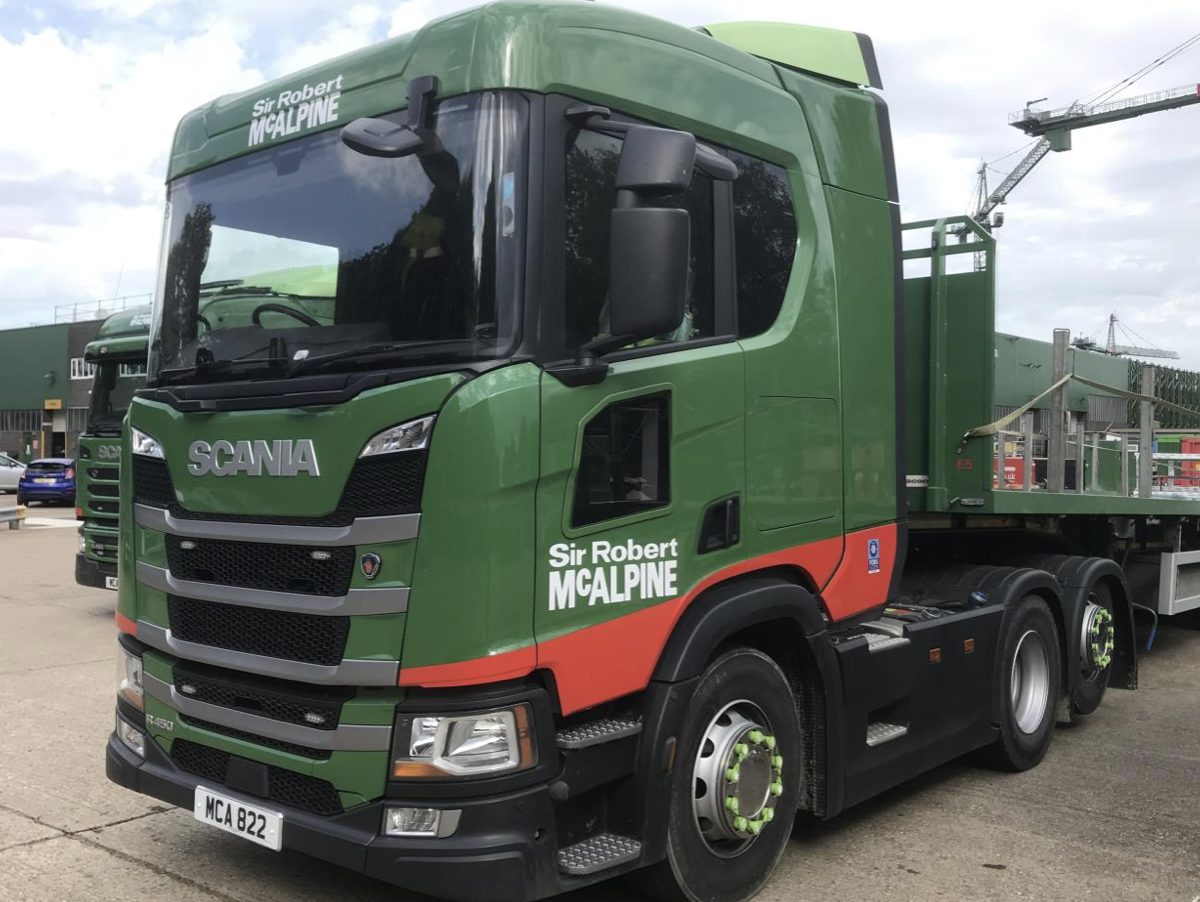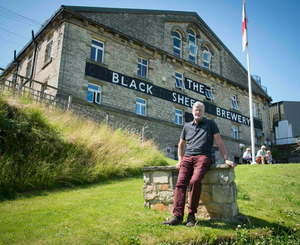Sir Robert McAlpine, one of the UK’s leading building and civil engineering companies, has long led the charge for greater safety and efficiency in UK construction projects.
Having worked on some of the UK’s most iconic buildings and projects, the Sir Robert McAlpine (SRM) mandate is clear, to ensure it leaves a lasting, positive legacy for local communities, striving for efficiency and minimising environmental impact during the lifecycle of a project.
The company, which marked its 150th anniversary in 2019, remains a family-owned business and recognises the pivotal role safe and efficient road transport supply chain plays in meeting its goals, and as such, began stipulating FORS accreditation as a requirement for all vehicles entering its sites back in 2012.
Now, with SRM’s own fleet accredited at FORS Gold – the highest level of the voluntary accreditation scheme – the company discusses the positive impact FORS has made to its building projects across the UK, and how the scheme helps guarantee safer more efficient road transport for the construction industry.
Paul Smith, Logistics Manager at SRM is charged with managing the company’s supply chain, from tier one suppliers through to sub-contractors and works closely with contractors to ensure vehicles entering each site are up to scratch, including verifying they are FORS accredited.
Paul Smith says, “Writing FORS into our contracts as a requirement for all vehicles was a step change in how we assure standards across our road transport supply chain. Historically price was the key driver for selecting contractors, with less emphasis on how the materials were getting to site. Now our practices are designed to ensure safety and environmental impact are the key drivers.
“It is our duty to ensure our sites are as safe and efficient as possible, for those who live and work in the immediate area and for our clients and the road transport supply chain has a big role to play in that.”
The company’s Delivery Management System requires all contractors to register vehicles before they to come on to any site and is set up to prevent the booking being made, if no valid FORS accreditation can be shown. The scale of this operation can be huge. For example, at SRM’s 100 Liverpool Street project in London, 40 road transport contractors were used throughout the project, each employing sub-contractors, totalling over 21,000 bookings created on the system over a four-year period. Because each booking may require more than one journey, as tippers collect and remove waste from the site, on an average day during this project 34 vehicles were booked on site, or up to 68 trips, with these numbers rising to up to 100 vehicle movements on days where large concrete pours were actioned.
Paul Smith says, “Companies must enter their FORS registration number to book on site, if not, the system doesn’t let them get any further in their booking. This reduces the incidents of turning vehicles away from site. However, as bookings can be made three days in advance, quite often the contractor registers a subcontractor, and then, perhaps another shows up, so Traffic Marshalls at the gate remain important to complete vehicle checks and verify FORS documentation.
“If a vehicle can’t prove it is FORS Silver accredited, this is flagged to the logistics team, and we do a non-compliant report. Should this happen twice we stop using that supplier, so it is taken very seriously across the business.”
These simple processes, which require all vehicles entering SRM sites to be accredited to FORS Silver, is paying off, Paul Smith adds, “The quality of vehicles which come onsite, and the safety equipment they have is now far better than before FORS. The difference in driver quality is also very noticeable. Drivers no longer think safety and efficiency ‘don’t matter’ and understand why measures are in place to protect vulnerable road users, and how they can help.’’
“Our traffic marshals at the site gate also receive thorough training on vulnerable road users, to the same end. They understand the importance of their role, learn how to check each vehicle and, most importantly, why they are checking each vehicle. This engagement is vital if these practises are to become embedded.”
The consolidation centre model is becoming more commonly used by SRM to help accurately manage site deliveries, reduce traffic flow, and lower emissions. This model sees contractors advance deliver goods to a specified hub outside the city or town in which the build is situated, with materials only arriving on site when they are needed. This reduces the need to move materials around a site, and the cost implication of potential damage to materials left onsite during the build, while also ensuring vehicles containing combined loads of materials are arriving fully loaded, to lower traffic levels.
Paul Smith says, “We have quite a complex supply chain, with many layers of sub-contractors so it’s important for us to ensure our compliance messaging feeds through from the original contract-holder, and consolidation centres really help. The company which managed the consolidation centre we used on our Bloomberg site in London for example, was FORS Gold accredited, so we knew all vehicles which came onto site automatically complied to the highest standard.
“Thanks to this model we reduced the number of vehicles coming on to the Bloomberg site by 66 per cent, from a calculated 9,099 deliveries which would have taken place using ‘traditional’ delivery methods to just 3,094 actual deliveries made via the consolidation centre. This is a huge reduction, not only in traffic but in CO2 emissions which were reduced by 53,782kg during this project. ”
Corporate approach
For SRM, engagement with FORS goes deeper than supply chain management. The company is represented on the FORS Governance and Standards Committee, which helps set the requirements of the FORS Standard, the document which sets out the requirements FORS members must meet to become accredited.
David Bucksley, Head of Health, Safety and Wellbeing at SRM says at a corporate level, FORS fits with the firm’s family values, including its ‘Be Safe, Home Safe’ mandate which underpins the business’s health and safety policies, including managing work relate road risk.
He says, “We think FORS is really important – for us, it is a minimum standard requirement – it is a must. FORS links to everything we stand for as a business and we are keen to attract a supply chain which is aligned to these values by working to support them in their accreditation. For example, we are now in the process of building FORS template materials into our own process documents and making FORS awareness part of our mandatory training matrix, so all operational sites are aware of what it stands for.”
What is more, the SRM fleet itself is FORS accredited, and has been since June 2013, moving up through the FORS progressive model to become FORS Silver accredited, and then onwards to FORS Gold, in 2020. The vehicles which work across the UK delivering SRM materials and equipment are based at its site in Kettering and managed by Steve Carter, Transport Manager at SRM, who is himself a qualified FORS Practitioner.
Steve Carter says the company is working hard to ensure its supply chain is fully aware of FORS and its requirements, across the country, and has increased this work in recent years as it grows its involvement with both FORS, and CLOCS - Construction Logistics and Community Safety – which aligns with FORS at FORS Silver.
He notes, “FORS has been very beneficial for us. It has certainly helped us improve our working practices, for example we keep records of fuel and AdBlue usage, so we can work out how much it costs to run each lorry and have upgraded our lorries to ensure they have visual aid warning systems and direct vision windows. We also utilise the training to ensure our drivers are fully aware of their responsibilities to improve road safety and the impact the lorries have on vulnerable road users, along with broader environmental effects such as noise pollution and efficient driving practices to reduce carbon emissions.”
For SRM, the quality of its supply chain is paramount, and the company continues to work closely with industry groups such as Build UK and CLOCS to ensure it is at the forefront of maintaining, and raising standards, including road transport.
David Bucksley adds, “Industry-wide there is always work which can be done to improve safety standards, and this is very much part of our culture at SRM. We are constantly educating our contractors on what we require, the quality of their vehicles, and the training of their drivers, and the message is understood that FORS is mandated country wide.
“The road transport supply chain has a huge contribution to each build, and we need to know each truck is of a high standard - FORS helps us achieve that.”






